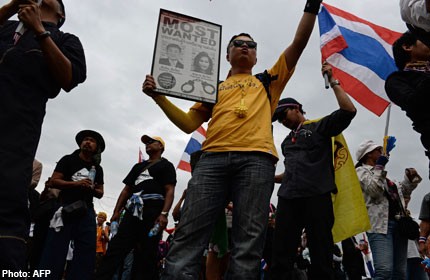Thai Senate delays debate on controversial amnesty Bill

BANGKOK - Thailand's Senate on Friday delayed debate on a government-backed amnesty Bill that has sparked mass protests, in a decision that could prolong political unrest.
Critics say the Bill is aimed at bringing former premier Thaksin Shinawatra back from self-exile without serving jail time.
Thaksin, still adored by his mostly poor, rural supporters but distrusted by many members of the establishment, was convicted in absentia in 2008 of corruption - charges he said were politically motivated.
His sister Yingluck Shinawatra is now prime minister.
The Lower House of Parliament has passed the political amnesty Bill and it has gone to the Upper House Senate. But a group of 40 Senators boycotted Friday's session, which failed to attract the minimum number of 75 members needed for debate.
"Due to a lack of quorum, debate of this amnesty Bill has been moved to Monday," said Senate Speaker Nikom Wairatpanij.
The decision could anger protest leaders who have put pressure on the Senate to reject the Bill. Some protest leaders have called for the government's ouster.
"Time is up for this corrupt and evil government. We will chase it out," said Mr Nitithorn Lamlua, a leader of the Network of Students and People for the Reform of Thailand group, the second-biggest faction among the protesters.
Thaksin, a billionaire former telecoms tycoon, became the first leader in Thai history to win a parliamentary majority on its own, and formed the first elected government to serve a full term, after which it was re-elected.
But corruption scandals eroded his popularity among Bangkok's middle classes. That was compounded by royalist accusations that he was undermining the powerful monarchy, which he denied.
He fled from Thailand in 2008 and lives in Dubai but is widely believed to be pulling the strings of government from abroad. He remains a hugely divisive figure.
The debate on Monday will coincide with a sensitive ruling by the International Court of Justice (ICJ) on disputed land next to the centuries-old Preah Vihear temple on the Thai-Cambodian border.
The temple is a hugely emotive issue in both countries but particularly in Thailand, where anger runs deep over a 1962 ICJ ruling that the ruins belonged to Cambodia. A small patch of land near the temple is still in dispute.
Thaksin promoted close ties with Cambodia when he was prime minister and his enemies have accused him of not defending Thai interests in relation to the border dispute, which has triggered sporadic clashes between Thai and Cambodian troops.
Some analysts fear that in the event of a ruling against Thailand on Monday, Thaksin's enemies could use it to whip up nationalistic anger against the government.
"Along with the outrage over this Bill, protest leaders may use the ruling to further inflame tensions," said political analyst Boonyakiat Karavekphan from Chulalongkorn University.
The amnesty Bill would absolve all leaders and protesters involved in unrest since 2004 of any wrongdoing.
Many of Thaksin's supporters criticise it for protecting leaders of a 2010 government led by the Democrat Party, who now head the opposition, who ordered the use of live ammunition to disperse pro-Thaksin protesters. About 90 people were killed in weeks of unrest.
The extent of opposition to the bill has prompted second thoughts among its government backers.
In a televised speech on Thursday, Ms Yingluck called for an end to the protests and said her government would not re-introduce the Bill if it was rejected by the Senate.
"The amnesty Bill has ended. We will withdraw everything,"said Ms Yingluck, who is widely seen as her brother's proxy.